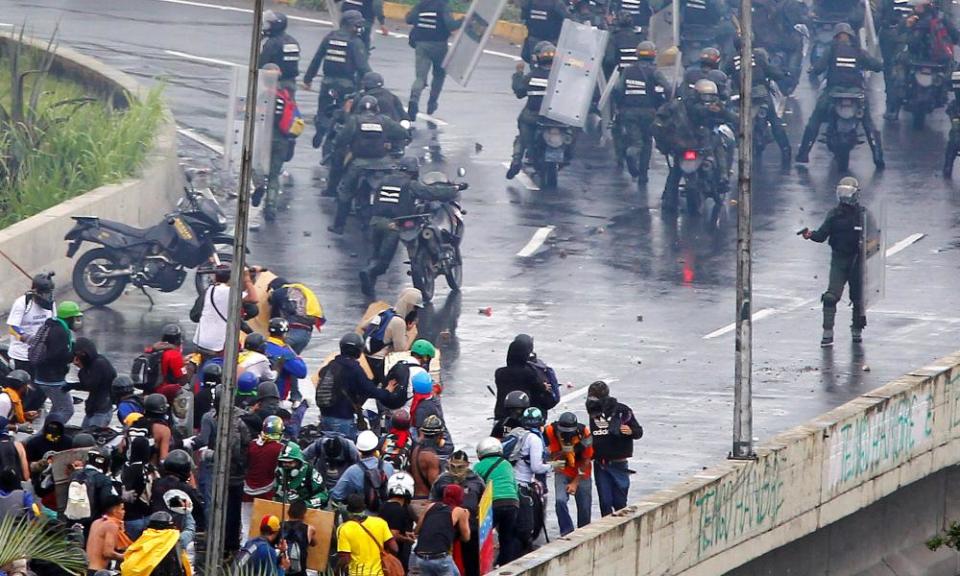Venezuela poised for new violence after security forces fatally shoot protester, 17
Fabian Urbina is first person to be killed by security forces during unrest
Supreme court announces charges against chief prosecutor Luisa Ortega Díaz

Venezuelans are bracing for a further escalation of violence after a 17-year-old protester was shot dead by the national guard, and the supreme court announced charges against the country’s attorney general – one of the most senior officials to speak out against the government of Nicolás Maduro.
Fabian Urbina died on Monday after security forces opened fire with handguns during clashes with demonstrators on a major highway in Caracas. Initial reports said six others were wounded – one of them critically – in the incident.
The interior minister, Nestor Reverol, confirmed Urbina’s death on Twitter, where he said the cause of death was presumed to be “excessive use of force” and added that those responsible would be “presented to their superiors to determine their responsibility”.
Con Fabian Urbina (17), aumentan a 75 muertes causadas en 80 días de protesta.Su madre quien padece de cáncer,debe soportar ahora este dolor pic.twitter.com/cngyho3YLW
— Obeysser Prada T (@Obeysser) June 20, 2017
Video footage of the incident shows Urbina, wearing a beige hooded sweater, running alongside a group of young protesters carrying wooden shields and throwing stones at a line of national guardsmen.
One of the national guard members can be seen drawing what appears to be a 9mm pistol and shooting into the crowd. Another clip, filmed moments later, captures the moment when Urbina collapses to the ground.
Urbina’s cousin Clemedy Flores blamed the government for his death. “The impunity is too great. The government does what it pleases. I just want this to end,” she told the digital media outlet Caraota Digital.
“It’s always young kids. It’s just kids who say they want a free country,” she added while fighting back tears.
Venezuelan law prohibits the use of lethal weapons during street protests, but the country’s security forces have been accused of increasingly repressive measures during three months of political turmoil.
In 2015, a new law sought to modify existing legislation and allow for the use of “potentially lethal force” during street protests. After outrage from human rights groups, the attorney general promised to revise the decree, but no public statement has been made on the law since.
More than 70 people have died since protests first erupted in April, following the supreme court’s decision to strip powers from the opposition-led Congress. Violence has erupted nearly every day in clashes between the security forces and protestors hurling stones and petrol bombs.
The victims include members of the police and national guard, passersby, and demonstrators who have been struck by teargas canisters or targeted by government supporters, but Urbina is the first person to have been shot dead by security forces.
Attorney general Luisa Ortega Díaz – who in recent months has become a high-profile thorn in the side of the government – has accused security officers of excessive force against protesters.
That has prompted a string of counter-accusations from government loyalists, ranging from support for “terrorism” to insanity.
On Tuesday, Ortega herself became the subject of an investigation after the supreme court said it had approved a request to lift her protection from prosecution for allegedly committing “serious errors” in her role.
Opposition activists said that she was being targeted for her criticism of Maduro’s plans to redraw the constitution, and promised to redouble their campaign of near-daily street protests.
“All Venezuelans need to stand up to rescue our nation’s democracy,” said National Assembly President Julio Borges at a press conference.
After more than 80 days of upheaval, some members of the country’s opposition admit that a measure of fatigue has started to set in.
But the moves against Ortega and Urbina’s death have together prompted fresh outrage in a country whose national hero, Simón Bolívar, once said: “Damned be the soldier who turns his weapons against his people.”
“In Venezuela, we grow up with this almost God-like admiration towards our independence hero,” said Miguel Rincón, a retired teacher who lives near where Urbina died, at the site of repeated clashes. “This happens while we are living under a so-called Bolivarian revolution. Damn the soldier, and damn his commanders!”
On social media, calls for revenge were swift, but few protesters believed that those responsible for Urbina’s death would be brought to justice.
“It is such an unequal fight,” said Laura Pérez, a shop owner who has joined in protests nearly every day. “And it’s so sad to see one of our kids dying every day. We really ought to think of a new strategy.”
But as Venezuela’s crisis heads into its third month, attempts at a political settlement have been fruitless. An attempted recall referendum was quashed last year by the electoral council on grounds that some of the signatures collected for its activation were fraudulent. Vatican-sponsored talks also failed.
On Tuesday, a meeting of the Organization of American States once again failed to approve a resolution that might have pushed for a political solution. Earlier in the day, Venezuela’s foreign minister, Delcy Rodriguez, walked out of the meeting, saying that her country would not recognize any motion it proposed.

